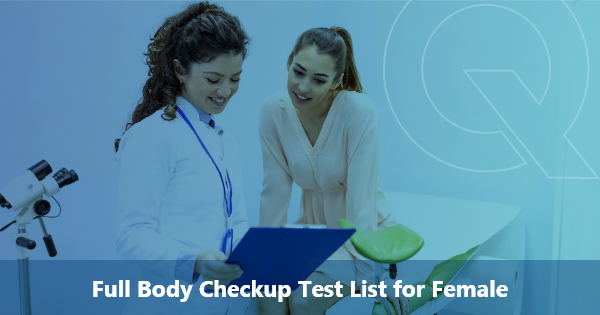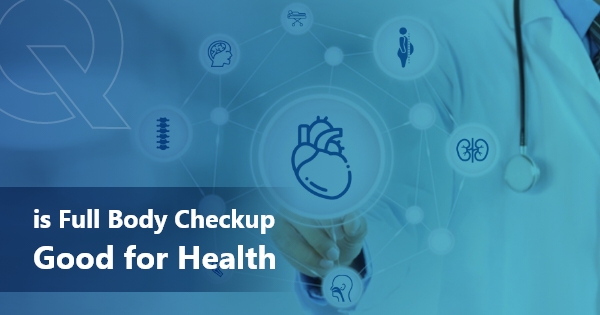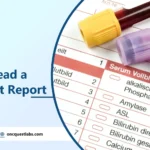A full-body checkup for females is a comprehensive health assessment designed to evaluate overall well-being and detect potential medical issues. These examinations are essential for promoting and maintaining good health throughout life. While the specific tests included may vary based on factors like age, medical history, and individual risk factors, a typical full-body checkup encompasses various screenings and assessments. In this guide, we will outline a general list of tests and examinations commonly included in such checkups, helping women make informed decisions about their healthcare and ensuring they receive the appropriate screenings and evaluations to support their health goals.
Contents
List of Full Body Checkup test for female
Certainly, a full-body checkup for females is a comprehensive health assessment aimed at detecting potential medical issues and ensuring overall well-being. The specific tests included can vary depending on age, medical history, and individual risk factors. Here’s a general list of tests often included:
1. Physical Examination: A thorough assessment by a healthcare provider, including vital signs, BMI, and overall health evaluation.
2. Blood Pressure Measurement: To monitor for hypertension (high blood pressure).
3. Complete Blood Count (CBC): Helps identify anaemia, infection, and other blood disorders.
4. Lipid Profile: Measures cholesterol levels to assess heart health.
5. Blood Glucose Test: Screens for diabetes or prediabetes.
6. Thyroid Function Tests: Evaluates thyroid gland health.
7. Liver Function Tests: Assesses liver function through various markers.
8. Kidney Function Tests: Evaluates kidney health, including creatinine and BUN levels.
9. Bone Density Test: Measures bone health, especially important for postmenopausal women.
10. Mammogram: A breast cancer screening test, typically recommended for women over a certain age.
11. Pap Smear: Screens for cervical cancer and may include HPV testing.
12. Pelvic Exam: Assess gynaecological health and check for abnormalities.
13. Bone Health Assessment: Including DEXA scans for osteoporosis risk assessment.
14. Eye and Dental Examination: Checks vision and oral health.
15. Breast Examination: To detect any lumps or abnormalities.
16. Ultrasound: May be used for abdominal or pelvic evaluation.
17. Electrocardiogram (ECG or EKG): Evaluates heart function and rhythm.
18. Skin Examination: For the detection of skin issues or melanoma.
19. Pulmonary Function Tests: Assess lung function.
20. Cancer Markers: Depending on risk factors and age, markers like CA-125 (ovarian cancer) or CEA (colon cancer) may be tested.
21. Bone and Joint Evaluation: Including X-rays or MRI scans for musculoskeletal health.
Remember, the specific tests can vary, so it’s essential to consult with a healthcare provider to tailor the checkup to your individual health needs and history. Additionally, the frequency of these tests may vary based on age and risk factors, so regular discussions with your healthcare provider are essential.
Benefits of Full Body Checkup test for female
Full-body checkups for females offer a range of benefits tailored to their unique health needs and considerations:
1. Early Detection of Health Issues: Regular checkups can identify health problems in their early stages, increasing the chances of successful treatment and minimising complications.
2. Women’s Health Screenings: These checkups include specific screenings such as mammograms, Pap smears, and pelvic exams to detect breast and gynaecological issues early, including breast cancer and cervical cancer.
3. Hormonal and Reproductive Health: Assessments of hormonal balance, fertility, and menopausal health can provide valuable insights into reproductive health and guide family planning.
4. Bone Health: Bone density tests can detect osteoporosis or osteopenia, helping to prevent fractures and maintain bone health.
5. Heart Disease Risk Assessment: Full-body checkups often include evaluations of heart health, helping to detect risk factors like high blood pressure and high cholesterol in women, who can be at risk for heart disease.
6. Thyroid Function: Thyroid function tests can identify thyroid disorders, which are more common in women.
7. Preventive Care: Health professionals can provide guidance on lifestyle factors, nutrition, and exercise to prevent conditions like obesity and diabetes.
8. Mental Health: Discussions with healthcare providers during checkups can address mental health concerns and provide resources and support for conditions such as depression and anxiety.
9. Women’s Wellness: These checkups offer an opportunity to discuss specific women’s wellness topics, including contraception, menopause management, and sexual health.
10. Family Planning: For women planning to start a family, checkups can include preconception counselling and assessments to ensure a healthy pregnancy.
11. Health Education: Full-body checkups provide opportunities for women to learn about their health, make informed decisions, and adopt healthier lifestyles.
12. Peace of Mind: Regular checkups can provide reassurance about one’s health and well-being, reducing anxiety and stress.
13. Long-Term Health: By addressing health concerns proactively, full-body checkups contribute to better long-term health outcomes and an improved quality of life.
Remember that the specific tests and recommendations may vary based on age, medical history, and risk factors, so it’s essential to consult with a healthcare provider to tailor the checkup to individual needs.
Frequently asked Questions
1. What is a full-body checkup for females?
A full-body checkup for females is a comprehensive health assessment designed to evaluate overall well-being and detect potential medical issues. It typically includes a series of screenings, tests, and physical examinations to ensure women’s health.
2. What tests are usually included in a full-body checkup for females?
Common tests included in a full-body checkup for females may comprise a physical examination, blood pressure measurement, complete blood count (CBC), lipid profile, blood glucose test, thyroid function tests, liver function tests, kidney function tests, mammogram, Pap smear, pelvic exam, bone density test, and more. The specific tests can vary based on individual factors.
3. How often should women undergo a full-body checkup?
The frequency of full-body checkups can vary depending on age, medical history, and risk factors. In general, it’s advisable to have a checkup at least once a year. However, women with specific health concerns or conditions may need more frequent assessments.
4. Are full-body checkups only for older women?
No, full-body checkups are recommended for women of all ages. The specific tests and screenings may vary based on age and risk factors, but regular checkups are essential for maintaining good health and detecting potential issues early.
5. Are there any specific tests for gynaecological health in a full-body checkup?
Yes, a full-body checkup for females often includes gynaecological tests such as Pap smears, pelvic exams, and mammograms to assess breast and reproductive health. These tests are crucial for early detection of conditions like cervical cancer and breast cancer.
6. Do I need a full-body checkup if I feel healthy?
Yes, even if you feel healthy, regular checkups are essential for preventive care and early detection of silent health issues. Many health conditions can develop without noticeable symptoms, so checkups play a vital role in maintaining well-being.
7. How can I prepare for a full-body checkup?
To prepare for a full-body checkup, you may be asked to fast before specific blood tests and provide information about your medical history, medications, and any symptoms you’re experiencing. It’s essential to follow any pre-checkup instructions provided by your healthcare provider.
8. Can I discuss specific health concerns with my healthcare provider during the checkup?
Absolutely, a full-body checkup is an excellent time to discuss any specific health concerns or questions you may have. Your healthcare provider is there to address your needs and provide guidance on maintaining or improving your health.





